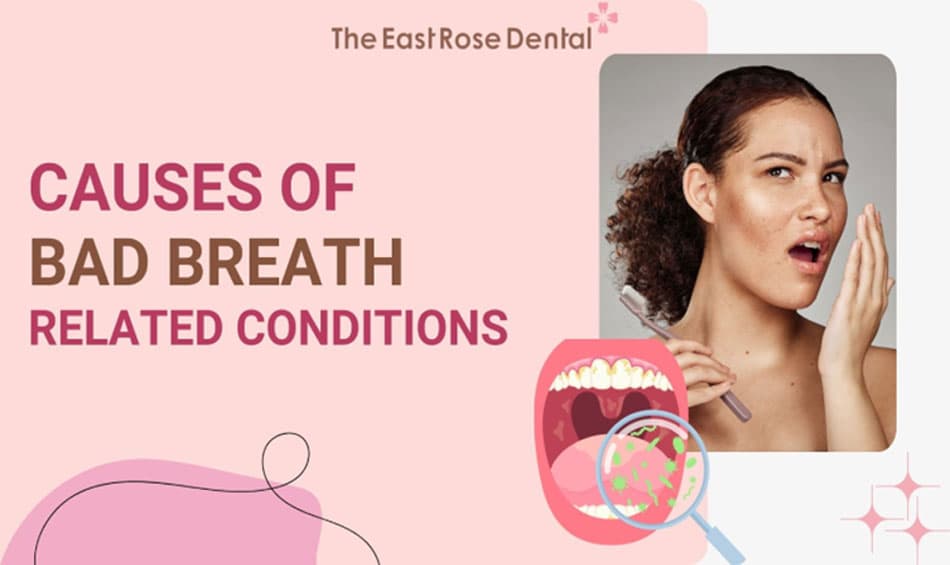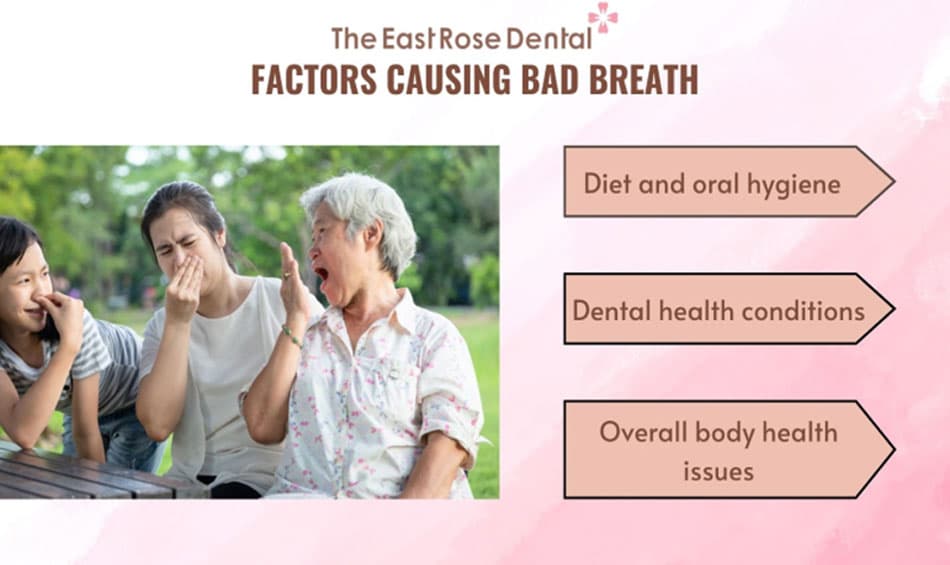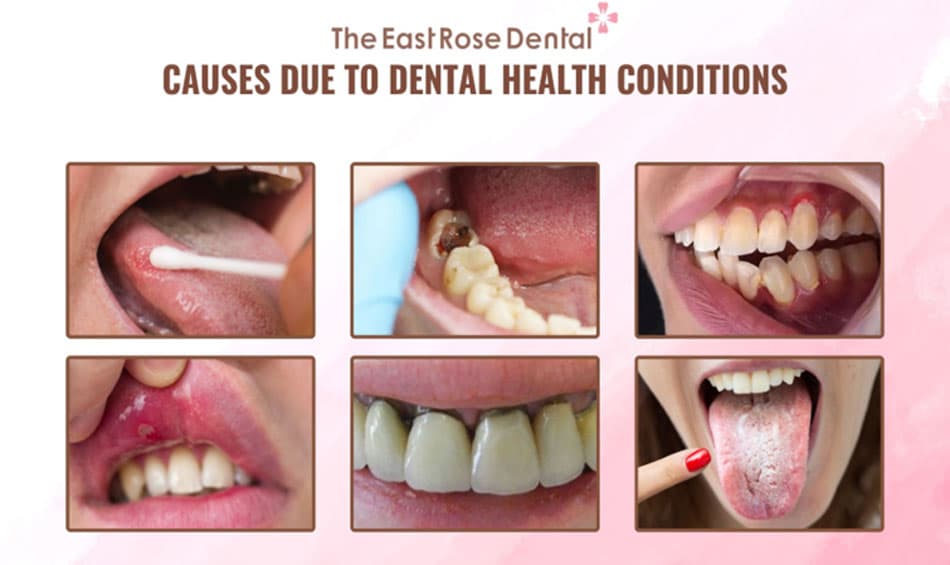Bad Breath: Main Causes and Related Conditions
Bad breath can be a nuisance and impact confidence in communication. However, it can sometimes be a sign of more serious health issues. So, what causes bad breath? Let The East Rose Dental Clinic provide a detailed explanation to help you not only improve your breath but also identify potential underlying health problems early.

Understanding Bad Breath and How to Identify It
Bad breath is a condition where your breath emits an unpleasant odor or bad smell when you talk. It is a common issue affecting people of all ages. Bad breath ranks third among dental problems, following tooth decay and gum disease, with approximately 25% of the population experiencing it to varying degrees.
To determine if you are dealing with bad breath, you can try the following simple methods:
- Lick the inside of your wrist and smell it. If you detect a bad odor, you may be experiencing bad breath.
- Check the smell on dental floss after cleaning your teeth, or cup your hand, exhale through your mouth, and smell to assess your breath.
Causes of Bad Breath

The mouth is the body's "gateway," so understanding bad breath requires identifying its causes. Below are some common reasons for bad breath that you should be aware of to find effective treatment methods.
Diet and Oral Hygiene
One of the most common causes of bad breath is poor diet and inadequate oral hygiene. Specifically:
- Food debris and bacteria: Food particles that remain stuck between teeth, at the gum line, or on the surface of the teeth and tongue create an environment for bacteria to thrive. These bacteria break down food and produce unpleasant-smelling compounds.
- Poor oral hygiene: Not brushing your teeth regularly at least twice a day, failing to clean your tongue, or neglecting to thoroughly clean your entire mouth can lead to the buildup of food debris and bacteria. This accumulation creates an environment conducive to bacterial growth, resulting in the breakdown of food and the formation of unpleasant-smelling compounds.
- Strong-smelling foods and spices: Consuming strong-smelling foods such as durian, fermented fish, onions, garlic, and aromatic herbs can make your breath more odorous.
- Drinks and bad habits: Alcoholic beverages like wine, beer, coffee, and carbonated drinks, along with smoking cigarettes or cigars, can dry out the mouth’s mucous membranes and create unpleasant odors.
- Irregular tartar removal: Failing to remove tartar regularly leads to plaque buildup at the gum line, providing a favorable environment for bacteria to grow and causing bad breath.
Dental and Oral Health Issues

Oral health plays a significant role in bad breath. Problems with teeth and gums can create environments where bacteria thrive, leading to unpleasant odors. Here are some common oral health issues that can cause bad breath:
- Tongue inflammation: When the tongue is inflamed, cracks on its surface create a low-oxygen environment, reducing saliva production. Reduced saliva allows bacteria to grow, causing bad breath.
- Tooth decay: Cavities in teeth create spaces where food and bacteria can accumulate and decompose. This decomposition produces foul-smelling compounds that affect breath.
- Gum and periodontal diseases: Conditions such as gingivitis, periodontitis, acute necrotizing ulcerative gingivitis, periapical abscesses, and abscesses can lead to bad breath due to bacterial buildup and inflammation.
- Sjogren's syndrome: This autoimmune disorder affects the salivary glands, reducing saliva production. This results in increased acid levels and creates a favorable environment for bacterial growth.
- Reduced saliva flow: In older adults or those undergoing medications, chemotherapy, or radiation therapy, reduced saliva production can lead to bad breath.
- Bone diseases: Conditions such as osteomyelitis, osteonecrosis, or dry socket can cause bad breath due to infection and damage to bone tissue.
- Candida infection: Candida fungi can cause bad breath, often accompanied by other symptoms like oral mucosal lesions.
- Gum disease from improper dental work: Recently, bad breath caused by gum disease from improperly fitted dental crowns has become more common, leading to bacterial growth and inflammation.
Read more: 15 common oral diseases and treatment
Systemic Health Issues
Bad breath can also signal underlying health problems. Here are some health-related causes of bad breath that you should be aware of:
- Medication side effects: Certain medications can cause bad breath, such as amphetamines, chloral hydrate, cytotoxic drugs, dimethyl sulfoxide, disulfiram, nitrates, nitrites, and phenothiazines. These drugs may alter the oral environment or cause dry mouth, leading to unpleasant odors.
- Respiratory conditions: Infections of the nasal and throat areas, including rhinitis, sinusitis, tonsillitis, and pharyngitis, can increase the risk of bad breath due to mucus buildup and bacterial growth.
- Digestive issues: Bad breath is often a symptom of gastroesophageal reflux disease (GERD). Infections with Helicobacter pylori, which cause gastric ulcers, can also lead to foul breath.
- Oral or lung cancer: Oral cancer can cause persistent bad breath due to the presence of tumors or infections in the mouth, leading to the release of unpleasant-smelling substances. Similarly, lung cancer can result in bad breath due to the spread of cancer cells or infections, creating a distinctive and unpleasant odor.
- Systemic diseases: Conditions such as diabetes, liver disease, and kidney problems can cause bad breath due to the breakdown of fats in the body and the accumulation of toxins.
- Fish odor syndrome: This rare genetic disorder results from a metabolic imbalance of trimethylamine. When the body cannot process this compound, it accumulates and produces a fishy odor in the breath.
Managing Bad Breath

Bad breath can significantly impact communication and daily life, creating feelings of self-consciousness. Understanding this, The East Rose Dental Clinic offers several effective strategies to improve this condition:
- Maintain good oral hygiene: Brush your teeth at least twice a day with fluoride toothpaste and use dental floss to clean between your teeth. Don’t forget to clean your tongue with a brush or scraper to remove bacteria and plaque.
- Use mouthwash: Antiseptic mouthwash can help reduce bacteria and unpleasant odors in your mouth. Opt for products containing ingredients like chlorhexidine or cetylpyridinium chloride.
- Regular dental check-ups and treatments: Visit your dentist regularly, at least twice a year, for check-ups and to address issues like cavities, gum disease, or other dental problems.
- Stay hydrated: Drinking plenty of water helps maintain saliva flow, which is essential for washing away food particles and bacteria, reducing dry mouth and bad breath.
- Control your diet: Avoid strong-smelling foods like garlic, onions, and spicy spices that can worsen bad breath. Instead, eat plenty of fruits and vegetables that help cleanse the mouth and provide essential vitamins.
- Quit bad habits: If you smoke or use nicotine products, consider quitting immediately, as these are major contributors to bad breath.
- Get a comprehensive health check: If bad breath persists and shows no improvement, seek a general health check-up to identify any underlying health issues such as diabetes, kidney, or liver problems.
The causes of bad breath have been thoroughly detailed and summarized by The East Rose Dental Clinic in this article. Understanding the underlying reasons and associated conditions will help you take a proactive approach to treatment and prevention. As a result, you can not only improve your breath but also feel more confident in your interactions and maintain overall health.
Services
Working Time
- Monday - Friday: 08:00 - 19:00
- Saturday: 08:00 - 18:00
- Sunday closed
Contact Info
- Hotline 1: (+84) 908 321 455
- Hotline 2: (+84) 931 857 885
- Mobile: (+84) 8 3925 8778
- Phone: (+84)2 838 258 778
- info@dentalrose.net
- rosedentalclinicvn@gmail.com
 English
English  Tiếng Việt
Tiếng Việt

